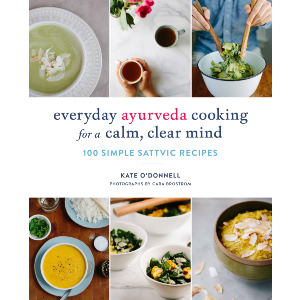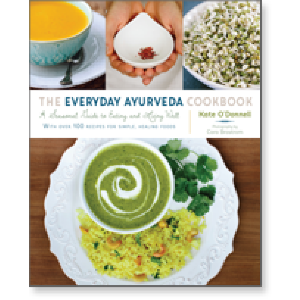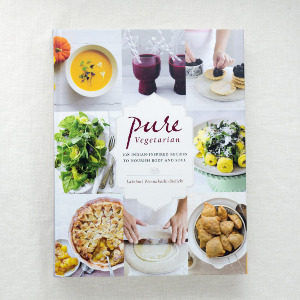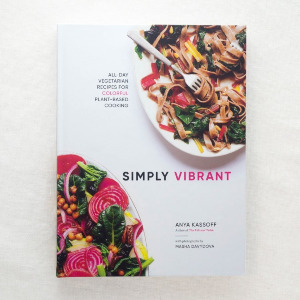by Kate O'Donnell, author of Everyday Ayurveda Cooking for a Calm, Clear Mind & The Everyday Ayurveda Cookbook
Natural, Seasonal, and Dosha-Specific Diet
Helping clients understand the medicinal aspects of food is one thing, while inspiring them to purchase, prepare, and enjoy beneficial foods can be another challenge altogether. Based on personal experience and observation of clients, I am a firm believer in the importance of a natural, seasonal, and dosha-specific diet. Twenty years ago, my first Ayurvedic doctor cautioned me against “outside food,” and it remains true for me that home-cooked food is balancing food.
Becoming an Ayurvedic Cookbook Author
Most often, I found convenience foods to be a contributing factor to imbalances, and in some cases, a causal factor. My emergence as an author of Ayurvedic cookbooks has been a direct result of my experience encouraging clients to eat homemade food and teaching them how to prepare recommended food items. Many already owned an Ayurvedic cookbook, but confusion about “my dosha” kept them from using these books as they felt unsure which recipes to prepare. Some even used dosha-specific food lists to restrict their diet without understanding the gunas of the foods and why one or another substance may be beneficial or non-beneficial. I found the linear nature of the Western mind, especially where diets are concerned, problematic in its readiness to create black-and-white scenarios about food, which in some cases caused more stress than benefit. The language and approach I used to share the Ayurvedic principles about food became the most important aspect of my teaching.
I found the linear nature of the western mind, especially where diets are concerned, problematic in its readiness to create black-and-white scenarios about food, which in some cases caused more stress than benefit.
Simple Ayurvedic Meals
In writing The Everyday Ayurveda Cookbook: A Seasonal Guide to Eating and Living Well I wanted to do two things: make it simple enough for the householder to prepare Ayurvedic meals and give equal importance to diet as well as lifestyle practices. I separated the recipes into 5 sections: Every Day, Fall, Winter, Spring, and Summer. The everyday recipes provide a spectrum of vegetarian breakfast/lunch/dinner recipes with neutral qualities, using grains, mung beans, cooked vegetables, and cumin, coriander, and fennel. The seasonal sections begin by explaining the qualities of the season and the foods to favor and reduce to balance those qualities. I also include recipes that use those foods. I find that readers have been cooking the recipes season by season. When I recommend the book for dosha-specific purposes, I point to the season and its qualities that mirror that of the dosha. I find clients are less likely to identify themselves as a dosha and remain free to focus on enjoying beneficial foods, while noticing the effects of non-beneficial foods when they eat them. For the Ayurvedic lifestyle, I explain dinacharya practices in an appendix and point to certain practices for “every day” and others seasonally.
The Mind at the Heart of Food Choices
While I can definitely report results from the first book in terms of people actually cooking and feeling better, so often I continue to find the mind at the heart of food choices. I have noticed how mental turbulence and day-to-day stress are affecting digestion. For this reason, I created the second cookbook, Everyday Ayurvedic Cooking for a Calm, Clear Mind: 100 Simple Sattvic Recipes. My intention with this new book is to bring the attention to the mind and the role it is playing in our health. In this book I keep it deliberately simple, breaking out three recipe sections: recipes to cultivate sattva, to relax and calm rajas, and to motivate tamas. I recommend the reader eat from the sattvic section anytime, the rajas section when feeling stressed out, and the tamas section when feeling dull or slow. Experience and observation have proved that even the best foods cannot heal when taken in haste, when mentally disturbed, or when the client believes this food can harm them. Mealtimes are a ripe time to shift the attention internally, to slow down, to relax. I want the Ayurvedic diet to be not only seasonal and dosha specific, but also deeply nourishing and contemplative. It is through Ayurveda’s synergy of physical and spiritual means that practitioners, and our clients, can create a relationship with the self that brings about a sustained state of balance.
Related Books
Everyday Ayurveda Cooking for a Calm, Clear Mind
$29.95 - Paperback
The Everyday Ayurveda Cookbook
$29.95 - Paperback
$20.95 - Hardcover
$35.00 - Hardcover







